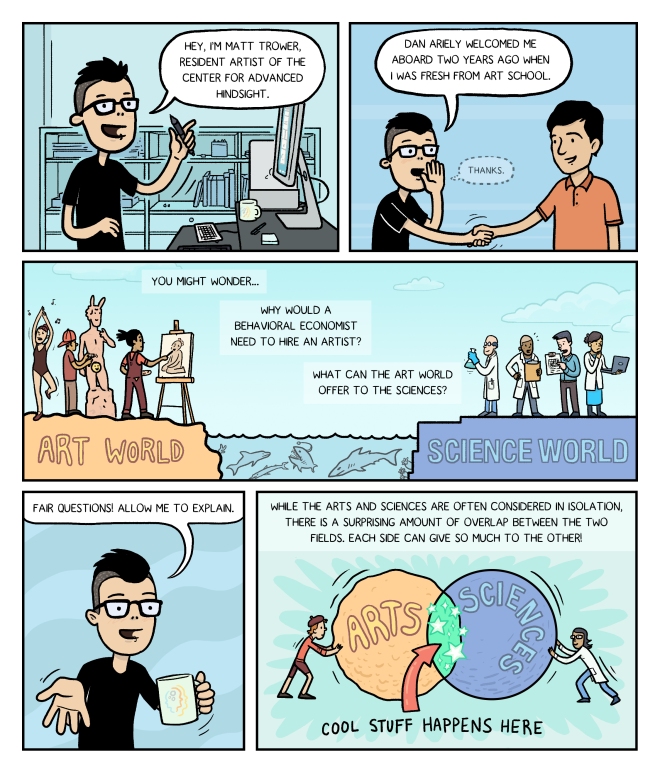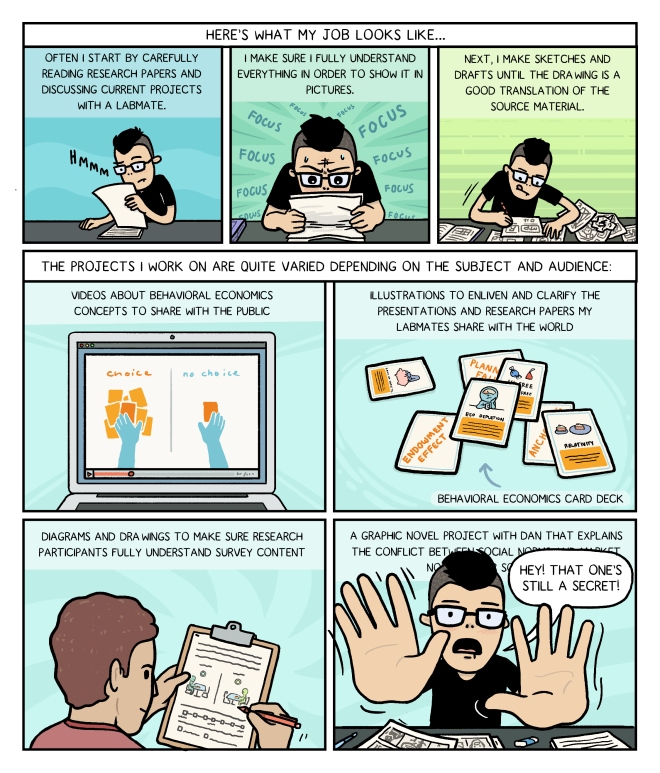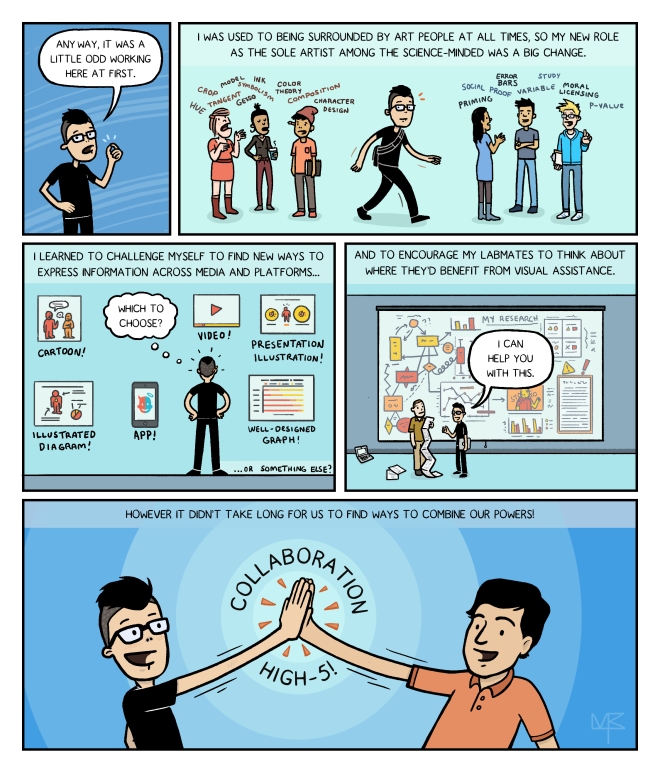Like this reviewer, you may discover some untapped talents after reading Irrationally Yours.
Irrationally Yours,
Dan Ariely
After reading Irrationally Yours, this entrepreneur is finally able to make her mark.
Irrationally Yours,
Dan Ariely
Hear her story on an open door policy below, and check out more reader responses in this album.
Irrationally Yours,
Dan Ariely
This reader got lucky after reading Irrationally Yours. Maybe you can get lucky too!
Irrationally Yours,
Dan Ariely
`IRRATIONALLY YOURS’ DELIVERS CLEVER ADVICE WRAPPED IN HUMOR
BY CHRISTINA LEDBETTER
ASSOCIATED PRESS
In his compilation of articles from his Wall Street Journal column, “Ask Ariely,” Dan Ariely wraps in a clever bow all the questions we’ve ever wanted answered concerning the behavioral intricacies that dictate the decisions we make.
He offers extremely practical advice, like babysitting friends’ children for an entire week to better estimate the costs and benefits of having children, in addition to brain-stretching teasers like how to choose the least used bathroom stall (it’s the one furthest from the door).
As always, Ariely’s intelligence is swathed in humility and charm. Bolstering his already likable writing style are cartoons by the talented William Haefeli, which help to humorously drive home Ariely’s points.
While “Irrationally Yours” offers some tangible steps on how one can stick to a diet or have a better time vacationing, it also offers something more. For example, in one piece we learn exactly why long commutes are so hard on us (in a word, unpredictability). In another, we learn how to feel better about ourselves in the midst of that traffic (in another word, altruism). On one page he offers concrete solutions, and on another, a different way to think about the problem in the first place, therefore minimizing our dissatisfaction.
Some answers are very insightful, with an added dose of humor. A few land solidly on the witty side and offer little sound advice. However, it’s this mix of academics and laughs that makes the book not only useful, but also enjoyable. Without the drawings and one-off jokey answers, “Irrationally Yours” could prove an information overload for someone seeking real decision-making help. But combine Ariely’s obvious intellect with funny quips and whip-smart cartoons, and you have a read that could lightheartedly change your life.
So for those less interested in a detailed write-up of lengthy experiments conducted using the scientific method and more interested in the conclusions those experiments deliver, Ariely’s words will offer high quality rationality with a quick pace. There is even a section providing insight about the best way to recommend a book. Taking a cue from Ariely himself, let’s just say heightened expectations are a safe bet this time.
Here’s my Q&A column from the WSJ this week — and if you have any questions for me, you can tweet them to @danariely with the hashtag #askariely, post a comment on my Ask Ariely Facebook page, or email them to AskAriely@wsj.com.
This week, in celebration of my new book Irrationally Yours (which is based on this column), I’d like to share some feedback that I received from a reader. Please enjoy the video.
______________________________________________________
Dear Dan,
I am ready to start investing for my retirement, but I’m struggling with those risk questionnaires. I’m not sure that I really know any of the answers. The results show that I’m somewhat conservative, but I don’t trust their conclusions. Any advice?
—Rick
Deciding how much risk to stomach in your investment plans is a huge decision that will have a major impact on your savings and ability to retire. AND I don’t think you should base that big decision on your response to some risk-assessment questionnaire. The questions in most of these risk-attitude-assessment tools are about feelings, but you should focus on how much money you’ll need to retire and the quality of life you would have under different investment scenarios. Let’s just assume that you hate the feeling of losing. So what? Should we doom you to a life of poverty just because you feel bad when you lose money? My advice: Figure out how your life might look like with various investment approaches, figure out which tradeoffs you are (and aren’t) willing to make and plan your investments accordingly. Meanwhile, you can deal with your fear of risk directly. Learn yoga, meditate, take some medication, avoid looking at your portfolio more than twice a year—do whatever you need to deal with your emotions, but make sure that doesn’t interfere with the way you decide to invest.
______________________________________________________
Dear Dan,
The other day, I ordered a new drink, a “London Fog tea latte,” at a local café. It arrived on the counter in a porcelain teacup with a saucer, and four lavender seeds were arranged in a fleur-de-lis at the center of the froth. The barista gave me a bestowing nod. It was the best tea latte I’d ever tasted; I found myself saying “Mmm” before the cup even reached my lips. Do our expectations actually affect how things taste to us?
—Chelsea
For sure. In an experiment we conducted about ten years ago at MIT, we gave the students two small beer samples and asked them to pick the one they wanted a full glass of. One sample was just plain beer, but the other sample was a regular beer plus some balsamic vinegar. We didn’t tell some students about the special ingredient, and they liked the beer with the dark additive. But when we told our tasters about the vinegar, their expectations kicked in; they expected to hate it and sure enough, they did. Such results show that expectations do indeed change what we like. More important, they show us that expectations are a fascinating interplay between our brain and our mind. We are always trying to predict the future and prepare for it. As our body changes to accommodate to the anticipated experience, it also makes those anticipations more likely to materialize. This is why expectations can change our actual experience—and why we should embrace them as much as we can. (My next answer, by the way, is going to be particularly insightful. Wait 30 seconds, and read on.)
______________________________________________________
Dear Dan,
My nephew has been downloading music and movies illegally from the Internet. How can I get him to respect intellectual-property rights without sounding self-righteous?
—Patricia
My own view on illegal downloads was deeply modified the day that my book on dishonesty was published—when I learned that it had been illegally downloaded more than 20,000 times from one website. (The irony did not escape me.) My advice? Get your nephew to create something and then, without him knowing, put it online and download it many, many times. I suspect that will make it much harder for him to keep up his blithe attitude toward piracy.
See the original article in the Wall Street Journal here.
My new book Irrationally Yours, based on my “Ask Ariely” column in the Wall Street Journal, comes out today.
In this video, I offer advice to passersby on everything ranging from commuting to work to a trip around the world.
Irrationally Yours,
Dan Ariely
 Tweet
Tweet  Like
Like 


